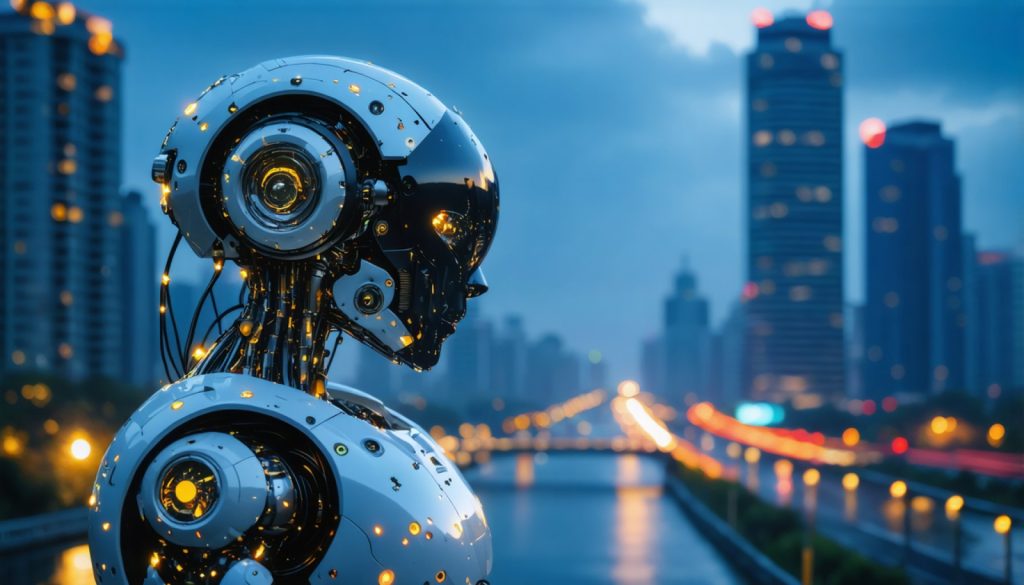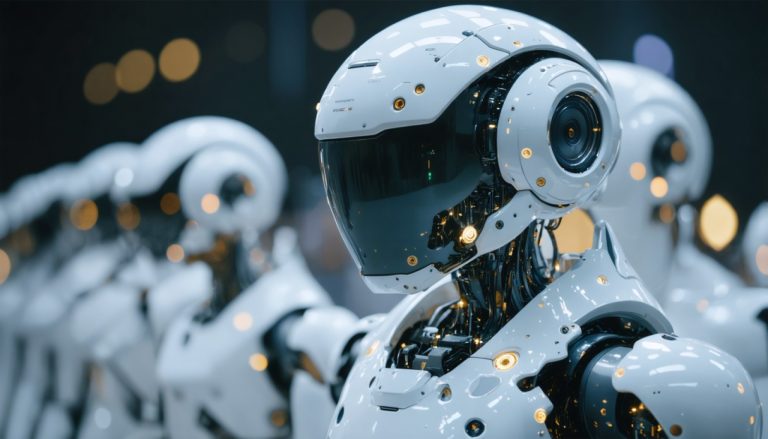
- AI is transforming global business sectors, from finance to construction, promoting efficiency and innovation.
- Shopify’s CEO, Tobi Lütke, mandates AI utilization, delaying human hires for tasks AI can manage, highlighting AI’s growing role.
- Tech enthusiasts like Lance Whitney integrate AI tools like ChatGPT into daily routines, reshaping digital interactions.
- Procore emphasizes AI’s role in addressing construction industry challenges, stressing upskilling to bridge workforce gaps.
- Bank of America’s workforce heavily relies on AI tools, integrating them into employee development and customer service frameworks.
- Retail innovations at Shoptalk showcase AI’s ability to enhance customer experiences through creativity and precision.
- AI is a current, not just futuristic, force driving business efficiency and competitiveness across all sectors.
- Businesses must embrace AI advancements to remain competitive or risk falling behind in a rapidly evolving landscape.
A vibrant wave of technological change crashes against the shores of global business this week, as AI’s omnipresence is felt from bustling finance hubs to vast construction sites. Central to the stir, Shopify’s bold CEO, Tobi Lütke, has unveiled a hiring mandate that all but declares AI as a new guardian of efficiency within its corridors. If a task could be handled by AI, human hires must patiently wait in line. This decision not only stirs the waters of corporate innovation but raises questions about the paradox of promoting technology while managing the human touch.
A few industries away, the virtual world flutters with potential as fervent users like tech journalist Lance Whitney embrace ChatGPT as a daily lifeline. From supplanting traditional web searches to offering conversational experiences that would make Siri envious, the AI tool has embedded itself in the fabric of everyday digital life. This echo of evolving digital dependence mirrors across sectors, urging businesses to explore AI as more than just a tool but as a pillar of future success.
Pulling a drape to reveal the construction industry’s innards, Procore’s “Future State of Construction” unveils a tapestry woven with AI-driven threads. Here, automation isn’t merely a buzzword but a pragmatic response to efficiency bottlenecks and a silver bullet for an aging workforce. With nearly half the workforce eying retirement by 2036, upskilling becomes a survival mantra, a strategy to bridge the yawning gap of expertise.
Even venerable institutions like Bank of America echo AI’s pervasive hum, as 90% of their workforce leans on technology-enhanced tools. These innovations aren’t merely desk accessories but are deeply embedded into the organizational structure, crafting an invisible safety net for employee development and customer interaction enhancements. This approach reveals a broader trend: the meticulous weaving of AI into the fabric of operational frameworks.
Retail’s shimmering conference stage at Shoptalk’s Spring 2025 event showcased AI not as an assistant but as an artist and storyteller. In an era where customer experience is currency, AI marries creativity with commerce, crafting narratives and enhancing service. Retail giants showcase the harmonious dance of human intuition paired with AI’s cold precision, asserting the future belongs to those who harness these twin forces.
The clamor for AI isn’t just about fascination. It holds serious implications for businesses ready to leap into this transformative tide. The resounding message from this week’s tech waves is clear: AI isn’t merely a futuristic concept but a present-day catalyst driving efficiency, innovation, and competitiveness. As these technological advances trickle down the economic hierarchy from giants to small businesses, the real takeaway is for companies to prepare their sandbox and play with these tools – or risk being left out of the game altogether.
Unlocking the AI Revolution: How Businesses Can Ride the Technological Wave Today
The Expanding Influence of AI Across Industries
AI technology is rapidly transforming industries, reshaping the way businesses operate and innovate. Notably, the decisions made by Shopify’s CEO, Tobi Lütke, highlight a pivotal shift where AI is becoming a cornerstone of operational efficiency. His mandate for prioritizing AI over human hires signals a broader industry trend: integrating AI not as a complementary tool but as a primary driver of efficiency.
Real-World Use Cases and Industry Trends
1. Retail & Customer Experience: AI is revolutionizing the retail industry by enhancing the customer experience. Companies now leverage AI for personalized marketing, predictive stocking, and virtual fitting rooms, thereby increasing customer satisfaction and sales. According to a 2023 report by McKinsey, retailers utilizing AI in their operations saw a 10-20% increase in sales growth compared to their counterparts.
2. Construction Sector Transformation: The “Future State of Construction” report by Procore highlights AI’s role in tackling labor shortages. The aging construction workforce necessitates innovative solutions for skill transfer and automation. AI-driven machinery and drones are being used for site inspections and maintenance, thereby improving safety and efficiency.
3. Financial Industry Overhaul: Institutions like Bank of America illustrate AI’s deep integration by using technology-enhanced tools for various functions such as fraud detection, customer service automation, and personalized banking. This integration enhances both employee productivity and customer experience.
How-To Steps & Life Hacks for Embracing AI
– Assess Your Needs: Identify processes within your business that can be automated or enhanced using AI tools. Focus on repetitive tasks where AI can save time and reduce errors.
– Upskill Your Workforce: Invest in training programs that enhance your team’s ability to work alongside AI technologies. Platforms like Coursera and LinkedIn Learning offer courses on AI and data analytics.
– Start Small: Implement AI in small-scale projects to gather data on its effectiveness before a full rollout. This approach minimizes risks and facilitates smoother integration.
Pros & Cons Overview
– Pros:
– Enhanced efficiency and productivity
– Improved customer experiences
– Cost savings in the long run
– Cons:
– Initial implementation costs can be high
– Potential job displacement
– Requires constant updates and monitoring
Insights & Market Predictions
Researchers predict that by 2030, AI could contribute up to $15.7 trillion to the global economy. Companies not adopting AI might find themselves at a competitive disadvantage. This trend indicates an urgent need for businesses to strategize AI adoption.
Security & Sustainability Implications
AI’s sustainability depends on its ethical use and the security measures in place to protect data. Organizations should prioritize secure data handling practices and develop ethical guidelines for AI implementation to ensure long-term benefits.
Conclusion and Actionable Recommendations
Businesses should start by exploring AI-driven tools relevant to their industry, focusing on areas where AI can most effectively drive value. Prioritize data privacy and ethical standards to build trust with customers and employees.
For more insights and resources on AI integration, visit Procore or Shopify for industry-specific applications.
Stay informed and proactive to harness the full potential of AI, keeping your business competitive and resilient in a rapidly evolving market landscape.



